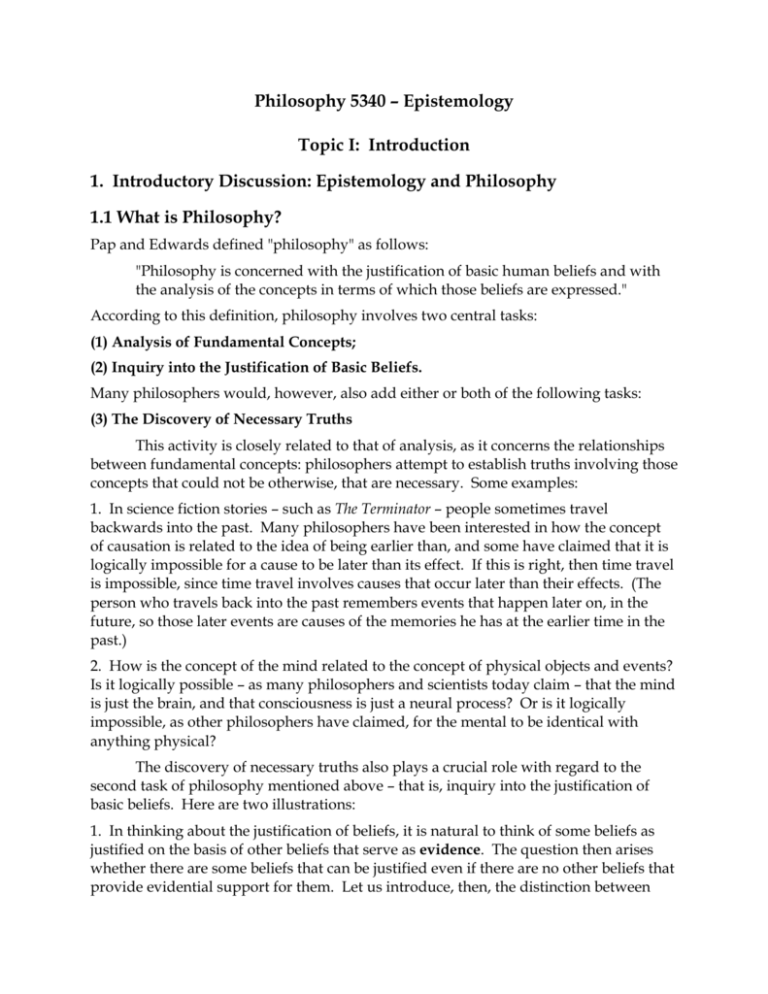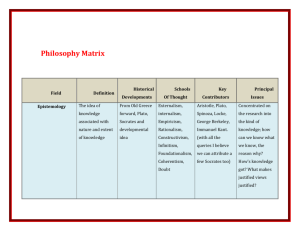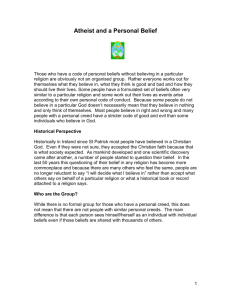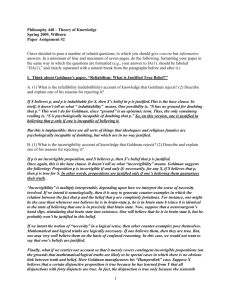Topic 1
advertisement

Philosophy 5340 – Epistemology Topic I: Introduction 1. Introductory Discussion: Epistemology and Philosophy 1.1 What is Philosophy? Pap and Edwards defined "philosophy" as follows: "Philosophy is concerned with the justification of basic human beliefs and with the analysis of the concepts in terms of which those beliefs are expressed." According to this definition, philosophy involves two central tasks: (1) Analysis of Fundamental Concepts; (2) Inquiry into the Justification of Basic Beliefs. Many philosophers would, however, also add either or both of the following tasks: (3) The Discovery of Necessary Truths This activity is closely related to that of analysis, as it concerns the relationships between fundamental concepts: philosophers attempt to establish truths involving those concepts that could not be otherwise, that are necessary. Some examples: 1. In science fiction stories – such as The Terminator – people sometimes travel backwards into the past. Many philosophers have been interested in how the concept of causation is related to the idea of being earlier than, and some have claimed that it is logically impossible for a cause to be later than its effect. If this is right, then time travel is impossible, since time travel involves causes that occur later than their effects. (The person who travels back into the past remembers events that happen later on, in the future, so those later events are causes of the memories he has at the earlier time in the past.) 2. How is the concept of the mind related to the concept of physical objects and events? Is it logically possible – as many philosophers and scientists today claim – that the mind is just the brain, and that consciousness is just a neural process? Or is it logically impossible, as other philosophers have claimed, for the mental to be identical with anything physical? The discovery of necessary truths also plays a crucial role with regard to the second task of philosophy mentioned above – that is, inquiry into the justification of basic beliefs. Here are two illustrations: 1. In thinking about the justification of beliefs, it is natural to think of some beliefs as justified on the basis of other beliefs that serve as evidence. The question then arises whether there are some beliefs that can be justified even if there are no other beliefs that provide evidential support for them. Let us introduce, then, the distinction between 2 inferentially justified beliefs and non-inferentially justified beliefs. Given that distinction, one can then ask whether, for example, the following proposition is a necessary truth: (a) No belief can be justified unless some belief is non-inferentially justified. If it turned out that this was a necessary truth, one could then go on to ask whether the same is true of the following, slightly stronger proposition: (b) Every belief is either non- inferentially justified, or justified on the basis of some set of beliefs, each of which is inferentially justified. 2. Later in this course, when we turn to the topic of the justification of induction, we shall be considering the choice between two competing conceptions of laws of nature. Confining oneself to the case of non-probabilistic laws, one can characterize the two views as follows. On the one hand, there is the reductionist view, according to which laws of nature are simply certain cosmic regularities. On the other hand, there is the metaphysically robust, ‘governing’ conception of laws of nature, according to which laws of nature are atomic states of affairs that logically determine what cosmic regularities obtain. Given that distinction between a reductionist view of laws of nature, and a governing view, here are two possible theorems that are crucially relevant to the epistemological question of whether induction can be justified: (a) If governing laws are logically impossible, then it can never be probable, relative to one’s evidence, that any cosmic regularity obtains. (b) By contrast, if governing laws are logically possible, then it can be probable, relative to one’s evidence, that certain cosmic regularities obtain. (4) The Development of a Systematic Overview – a Synoptic View – of Reality as a Whole What is involved in this fourth activity? The basic goal here is to arrive at a picture of reality as a whole that is both comprehensive and plausible. Doing this may turn out to be considerably more difficult than one would initially think. For it may turn out that some of the things that one believes do not cohere very well with other things that one believes. There may even be, or appear to be, outright inconsistencies. One Illustration: The Nature of the Mind, and its Place in Reality Consider physics. Its goal is to provide a complete account of physical reality – including both all of the fundamental particles and forces that make up the physical world, and all of the laws that govern the those forces, and the interactions of fundamental particles. But how does the mind fit into this picture? Is it something more, something non-physical? If it is, does it act upon the physical world? Do particles in my brain behave differently because of the causal impact of my mind upon those particles? If so, then physics is not the complete story about the behavior of the things, such as electrons, that make up the physical world? So isn't there a serious 3 tension, at the very least, between what physicists tell us about the physical world, and beliefs that most of us have about ourselves? Another Illustration: Human Freedom and Moral Responsibility, and the Determinism of Newtonian Physics In some cases, there may be more than tension: beliefs in different areas may be, or at least appear to be, inconsistent with one another. As an illustration, suppose that one were living in the previous century. On the one hand, one would be confronted with a very remarkable scientific achievement – Newtonian physics – that explained an extraordinary range of phenomena, and that did so very, very precisely. Newtonian physics is, however, completely deterministic: given the positions and the velocities of every fundamental particle at some specific time, the positions and the velocities of everything at any other time follows in virtue of the laws of Newtonian physics. But on the other hand, you might also have been strongly inclined to believe that you were free in a significant way – so that you had the power, for example, either to hold on to the pen that you're now holding for another ten seconds, or to let it go instead. But if Newtonian physics were true, could you be free in that way? Could you have the power freely to choose to do either of those things? There are various ways of attempting to resolve this inconsistency, or apparent inconsistency. One is to say that there is not really any inconsistency, on the grounds that when the term "free" is correctly analyzed, it turns out that freedom is perfectly compatible with complete determinism. But another way is to give up one of the beliefs in question: either one could conclude that Newtonian physics is at best an approximation to the truth, and that the truth about the physical world is that it is not completely deterministic – a conclusion that would receive support if one moved from the 19th century into the early part of 20th century, when quantum mechanics was developed. Alternatively, one could conclude instead that freedom is really an illusion that arises because one is not aware of the very small events – namely, events in one's brain – that cause one's behavior, and that in fact one is not really free. 1.2 Epistemology Questions of justification lie at the very center of epistemology, but, as we shall see, questions of analysis are also very important. 1.2.1 Analysis How does analysis comes into epistemology? Essentially, in three main ways: (1) There is the analysis of concepts that are themselves epistemological concepts. The most obvious is the concept of knowledge itself. But there are a number of other central concepts, such as those of: (a) a belief's being justified; (b) a belief's being inferred from another belief; (c) a belief's being inferentially justified, or being a case of inferential knowledge. Other important epistemological concepts include: (i) the idea of a belief's 4 being absolutely certain; (ii) the idea of degrees of belief; (iii) the idea of logical probability. (2) Secondly, there is the analysis of different types of statements, such as: (a) statements about physical objects; (b) statements about other minds and their mental states – such as beliefs, desires, sensations, experiences, etc.; and (c) statements about the past, and about the future. Why is analysis of such statements important? The reason is that questions of analysis interact with questions of justification. Thus, for example, what account one gives of the justification of beliefs about physical objects, or of beliefs about other minds, turns out to depend crucially upon what the correct account is of the meaning of statements about physical objects, and about other minds, respectively. (3) Thirdly, when one attempts to analyze fundamental epistemological concepts, or statements that express propositions that one may know, or at least be justified in believing, other concepts may turn out to play a role in the analysis. Thus, for example, counterfactual statements – that is, statements that say that if one thing were the case, something else would be the case – often enter into the analysis. Such statements are used, for example, in some analyses of epistemological concepts such as knowledge and inference, and in some analyses of statements about physical objects, and of statements about other minds. Moreover, it may turn out to be important, for such analyses, what account is to be given of the truth conditions of counterfactuals. 1.2.2 Justification In answering skeptical challenges to claims that one has knowledge, or at least justified beliefs, one would like not only to show that one does have knowledge or justified beliefs, but also to provide some positive account of how one has that knowledge, or of how the claims in question are justified. So it is natural to think here in terms of two tasks, connected with the following questions: (1) Can one have knowledge – or at least justified beliefs – that various things are the case? For example, can one know that there are physical objects, that there are other minds, that certain things happened in the past, or that other things will happen in the future? (2) If one can have such knowledge, or if one is justified in believing certain things, what account is to be given of how it is that one has that knowledge, or of what exactly the justification of the belief in question is? It may well be, however, that though one can raise these two separate questions – the question of whether one is justified, and the question of precisely what the justification is – that there is really only a single task here, since it may well be that the only way of answering the first question is by answering the second – that is, it may be that the only way that one can show, for example, that one is justified in believing that there are other minds is by defending some specific, positive account of how beliefs 5 about other minds can be justified. Indeed, this is my own view. Some philosophers hold, however, that the burden of proof is upon the skeptic in these areas, and that unless the skeptic can offer some convincing reason for accepting skepticism, then one is justified in rejecting it. If this view of matters were correct, then one might well be able to answer the first question without answering the second, since if one could show that the skeptic's arguments were unsound, one would have shown that our ordinary beliefs were justified, and showing that the skeptic's arguments were unsound might not require any positive account of the justification of the beliefs in question. Showing that the skeptic’s arguments are unsound could, in turn, be done in either of two ways. First, one could examine individual arguments, and then show that each argument had some flaw or another – either fallacious reasoning, or an implausible premise. Secondly, however, one might instead be able to develop some general argument that showed that no skeptical argument could possibly be sound. As we shall see when we turn to Michael Huemer’s discussion of skepticism, this is precisely what G. E. Moore and Michael Huemer have attempted to do. 1.2.3 The Place of the Concept of Knowledge in Epistemology Epistemology is often referred to as the theory of knowledge, so it is very natural indeed to think that the concept of knowledge is essential to epistemology. When we turn to Topic 2 – The Problem of Analyzing the Concept of Knowledge – we shall see that a number of quite different views have been advanced concerning how the concept of knowledge is to be analyzed, and it may well be far from clear what the correct account. If the concept of knowledge is essential to epistemology, this may seem troubling. I am not at all convinced that the concept of knowledge is crucial for epistemology. Considered the following question: “Why is knowledge better than justified belief?” One answer is that if one knows something, then it follows that the thing in question is true, whereas a belief may be justified, but false. But then one can go on to ask, “Why is knowledge better than justified, true belief?” At one point, the answer was that it wasn’t, since it was widely thought that knowledge just was justified, true belief. But as we shall see when we turn to Topic 2, there appears to be excellent reasons for rejecting that analysis of knowledge. But if one can have justified true belief that is not knowledge, the question arises, as to whether knowledge is preferable to, or more valuable than, justified true belief, and if so how and why. My own view is that the major problems in epistemology can all be discussed in terms of the idea of justified belief: the concept of knowledge is unnecessary. 1.2.4 Justified Belief, Normativity, and the Threat of Moral Skepticism Whether a belief is epistemically justified is connected with whether one ought or not believe it. What is the connection? A natural answer is this: 6 S ought to believe that p if and only if S’s belief that p is epistemically justified. But this overlooks the possibility that there might be good reasons of a nonepistemological sort for accepting or rejecting a belief. Pascal, in his famous Wager Argument, attempted to show – unsuccessfully – that there was a good prudential argument for believing in the existence of God even if it one was epistemically justified in believing that the existence of God was extremely unlikely. More generally, some beliefs that are epistemically reasonable may be such that their acceptance has bad consequences, while some beliefs that are epistemically unreasonable may be such that their acceptance has good consequences. The upshot is that one needs to distinguish between an epistemic justification for a belief and a non-epistemic justification for a belief. Then one can say, If S’s belief that p is epistemically justified, then, non-epistemic considerations aside, S ought to believe that p, while if S’s belief that p is not epistemically justified, then, nonepistemic considerations aside, S ought not to believe that p, Regardless of the details, however, it is natural to connect the idea of a belief’s being justified or unjustified with the idea of what one ought or ought not believe. But if that’s right, then doesn’t epistemology rest upon the assumption that there are objective moral truths, the supposition that moral skepticism is not true? If that’s right, isn’t that troubling? For there are serious arguments – and arguments that many philosophers believe are quite plausible – for the conclusion that moral skepticism – often in the form of what is know as J. L. Mackie’s Error Theory – is true. Some philosophers have thought that one could use this connection as an argument against moral skepticism, along the following lines: (1) Some of our beliefs are epistemically justified. (2) If a belief is epistemically justified, then, other things being equal, one should not reject those beliefs. (3) If it is true that one should not reject certain beliefs, then moral skepticism is false. Conclusion: (4) Moral skepticism is false. My view is that this is a bad argument against moral skepticism, and for two reasons. The first is that it assumes that skeptical arguments in epistemology can be refuted, and it is not at all clear that the claim can be sustained. The second – and this is the crucial point – is that epistemology does not need any normative concepts. Consider the following claim: 7 Normative truths supervene upon non-normative truths, in the sense that if state of affairs A differs in axiological value from state of affairs B then A and B must differ with regard to non-normative properties or relations that they involve, and, similarly, if action A differs in moral status from action B then A and B must differ with regard to non-normative properties or relations that they involve. Whether a belief is justified then, must supervene upon non-normative states of affairs, and epistemology then can ignore normativity, and focus simply upon the nonnormative states of affairs that underlie justification. But what will those non-normative states of affairs be? My view is that they will be facts concerning epistemic probability. The upshot is that epistemology can in principle dispense with both the concept of knowledge and the concept of justified belief, and focus instead simply upon the probability that various beliefs are true. 2. The Content of this Course Given the above, I can now describe very briefly what I shall and shall not be covering in this course. 1. The course will be primarily concerned, first, with the analysis of fundamental epistemological concepts – such as the concepts of knowledge, and inference; secondly, with skeptical challenges to claims to knowledge and justified belief in a variety of areas – such as knowledge of the external world, knowledge of other minds, knowledge of the past, and knowledge of general laws of nature; and thirdly, with the different types of alternative accounts that can be offered of the justification of one's beliefs in various areas. 2. There are, however, other sorts of knowledge claims that people advance – concerning, for example: various religious questions, such as that of the existence of God; questions in meta-ethics about whether there are objective values; questions in ethics, about what actions are right or wrong, and what things are good or bad; questions in aesthetics, concerning the value of different works of art. These are interesting and important questions. They are not, however, questions that will be covered here. An investigation of these and other claims to knowledge in controversial areas call for specialized discussions. This is not to say, however, that an understanding of the ways one can attempt to justify beliefs in areas that – leaving aside for the moment skeptical challenges – are relatively uncontroversial, is irrelevant to claims in more controversial areas. On the contrary, it seems to me that familiarity with the issues that arise in the more mundane areas of perceptual knowledge, knowledge of other minds, knowledge of the past, etc. can prove invaluable when one comes to examine knowledge claims in other, much more controversial areas – such as religion, ethics, and aesthetics. 8








